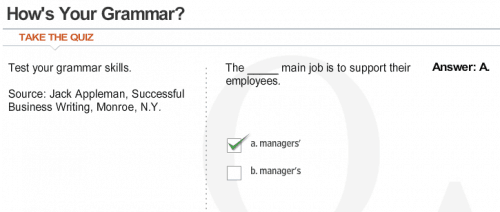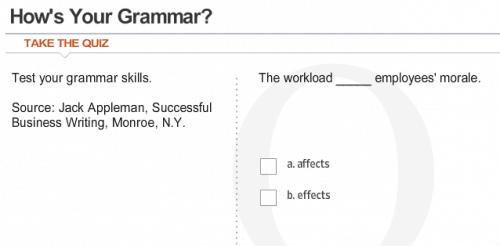Last week, my dad pointed out this grammar quiz on the Wall Street Journal website (as part of the article “This Embarrasses You and I*: Grammar Gaffes Invade the Office in an Age of Informal Email, Texting and Twitter.” We both scored 22 out of 22 on the quiz, as my dad and I know the headline should be “This Embarrasses You and Me” although that sounds wrong to many.
There was something embedded in the quiz that was more interesting (perhaps) than any grammar cop differences between affect and effect or you're and your. Two of the questions referred to leadership… and Lean concepts.
One of the questions referred to the main job of managers — to support their employees. This sounds like servant leadership, something that's a big part of the Lean philosophy.
Another question is related to Lean and the concept of “muri” or overburden:
When workloads and expectations are ridiculously high, morale suffers. In the Lean approach, we need to make sure we have the RIGHT staffing levels to meet customer needs and to allow people to do high quality work without being forced into cutting corners.
So, while the Wall St Journal usually gets it really wrong talking about Lean concepts, Mr. Jack Appleman, their grammar quiz writer, gets it, even if it's just “Like Lean.”
Please scroll down (or click) to post a comment. Connect with me on LinkedIn.
Let’s build a culture of continuous improvement and psychological safety—together. If you're a leader aiming for lasting change (not just more projects), I help organizations:
- Engage people at all levels in sustainable improvement
- Shift from fear of mistakes to learning from them
- Apply Lean thinking in practical, people-centered ways
Interested in coaching or a keynote talk? Let’s talk.
Join me for a Lean Healthcare Accelerator Trip to Japan! Learn More












Mark, you have a great eye for seeing Lean-related content! But “A” wasn’t the correct answer for the first one, correct? It should be manager’s. “The” implies singular, yes?
Thanks! :-)
The “their” later in the sentence indicates plural. It’s not grammatically correct to use “their” as a gender-free substitute or his or her.
Kudos to you for seeing the links to lean in the WSJ grammar quiz! To me, this issue is one of respect. if your communication is confusing, you waste people’s time. It’s not clear what you’re saying or what we’re supposed to do.
Comments are closed.